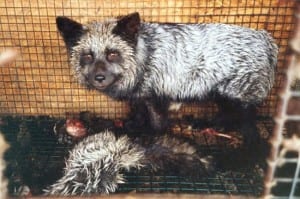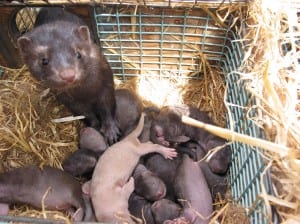Animal Rights: The Abolitionist Approach

A number of writers have claimed that we need to support other than an abolitionist approach because that approach has been marginalized politically and has been unsuccessful.
For example, in their book, Zoopolis: A Political Theory of Animal Rights, Sue Donaldson and Will Kymlicka observe:
A central task for the movement is to figure out why ART [animal rights theory] remains so politically marginal. Why is the general public increasingly open to welfarist and ecological reforms, such as Proposition 2 or endangered species legislation, while remaining implacably resistant to animal rights? Having acknowledged that animals are living beings whose suffering matters morally, why is it so hard to take the next step and acknowledge that animals have moral rights not to be used as means to human ends?
Donaldson and Kymlicka claim to be very sympathetic to the abolitionist perspective. But they ask: why has this position remained so marginal?
I will have a great deal more to say about this book in a response that I am writing to Professors Kymlicka and Donaldson, as well as to others who have written recently about abolitionist theory. But I find it odd that they think that there is mystery here.
The “animal movement” is dominated by large groups that promote welfare reform and actually go out of their way to marginalize the abolitionist perspective.
It is not likely that the public, which is concerned about animal ethics, will “take the next step” when Peter Singer, the so-called “father of the animal rights movement,” claims:
if someone “really were thorough-going in eating only animals that had had good lives, that could be a defensible ethical position. It’s not my position, but I wouldn’t be critical of someone who was that conscientious about it.”
According to Singer, as long as we provide a reasonably pleasant life and a relatively pleasant death, we can discharge our moral obligations to animals. For example, Singer says:
[T]o avoid inflicting suffering on animals—not to mention the environmental costs of intensive animal production—we need to cut down drastically on the animal products we consume. But does that mean a vegan world? That’s one solution, but not necessarily the only one. If it is the infliction of suffering that we are concerned about, rather than killing, then I can also imagine a world in which people mostly eat plant foods, but occasionally treat themselves to the luxury of free range eggs, or possibly even meat from animals who live good lives under conditions natural for their species, and are then humanely killed on the farm. (The Vegan, Autumn 2006)
So Singer tells the public that animal welfare is a morally defensible response to the fundamental questions of animal ethics. Why should anyone go further? Why would anyone go further?
Why should they go vegan when CEO of The Humane Society of the United States Wayne Pacelle, himself a vegan, makes it very clear that “happy” meat is a morally good thing? Pacelle states:
I don’t think that everyone needs to adopt a vegetarian diet to make a difference. I think that little choices that we make — getting animal products from a farmer who is raising animals in a proper and humane way or reducing consumption by a little bit — all of these things matter. You don’t need to go the full measure in order to have an impact. One thing I don’t want is people to feel paralyzed, that somehow you’ve got to fit some orthodox regimen in order to be a part of this. Absolutely not. Little decisions that all of us make can have an enormous consequences.
You can have an impact by eating meat and animal products “from a farmer who is raising animals in a proper and humane way.”
So HSUS is not only suggesting that products made “in a proper and humane way” are actually available, but that consuming them is consistent with treating animals as members of the moral community and caring morally about them.
HSUS actively promotes the consumption of meat and other animal products.
Donaldson and Kymlicka observe that even People for the Ethical Treatment of Animals (PETA), perceived to have a radical message, promotes welfare reform.
Again, if people who are perceived by the public to be speaking for the animals claim that welfare reform is all that is morally required, why would the public think otherwise?
As I stated in the book I co-wrote with Professor Robert Garner, The Animal Rights Debate: Abolition or Regulation?”:
The modern animal movement has never promoted a clear and unequivocal abolitionist/vegan message. On the contrary. Almost all of the large groups in the United States, UK, and elsewhere promote a welfarist approach, and to the extent that they even talk about the abolitionist/vegan approach, they present it as some sort of distant and utopian goal. They often pejoratively label veganism as “absolutist,” “fundamentalist,” or “purist” and, following Singer, promote being a “conscientious omnivore” as a morally defensible position.
Please understand that I am not saying that if all of the animal groups shifted focus and promoted a clear and unequivocal abolitionist/vegan campaign, we would abolish exploitation overnight or anytime soon. But we would at least start the required paradigm shift by focusing discussion on the right issues. The welfarist model has failed and will continue to fail because it focuses discussion on the wrong set of issues. And I very much disagree that the right not to suffer, without a discussion about the morality of use per se, is going to lead anywhere other than to more of the same welfare regulation.
So in response to the question asked by Professors Donaldson and Kymlicka, the problem is not that the abolitionist perspective is marginal; the problem is that the abolitionist position has been actively marginalized by an animal movement consisting of enormous animal charities that dominate the marketplace of ideas and tell the public that welfare reform is all that is necessary.
*****
If you are not vegan, please go vegan. Veganism is about nonviolence. First and foremost, it’s about nonviolence to other sentient beings. But it’s also about nonviolence to the earth and nonviolence to yourself.
Gary L. Francione
Professor, Rutgers University
©2012 Gary L. Francione




![[Credit: bilbord99]](https://www.greanvillepost.com/wp-content/uploads/2013/08/hen-farm3_static_flickr_com_10457_9309886803_d3c739c09e_n_946.gif)
